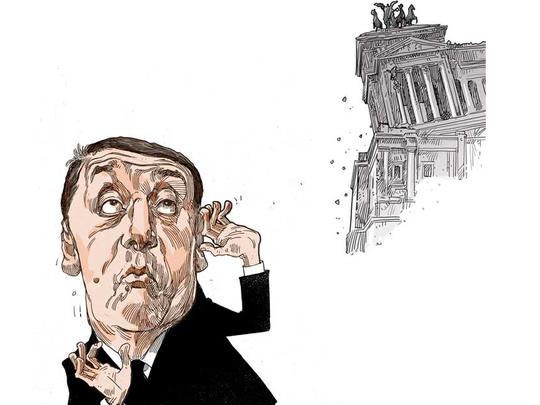
With a crushing defeat for Prime Minister Matteo Renzi in the referendum, Italy lost a valuable chance to reform its failing constitution. It has condemned itself to further decades of ineffective government as the equally balanced Chamber of Deputies and the Senate exercise their constitutionally equal powers sends draft laws shuttling between each other till either all parties get exhausted and run out of steam or the law is eventually passed.
When Renzi launched his campaign to reform the constitution, he had just succeeded in getting landmark reforms of Italy’s labour market and notorious justice system, and seemed ready to find a way to give the government of the day more authority to act effectively. Obviously no-one wants the ludicrous comedian Beppe Grillo and his Five Star movement to take charge of Italy, nor the anti-European Matteo Salvini and his Lombard League. But fear of such characters winning untrammelled power frightened off a number of voters who might have backed Renzi’s move for a more authoritative Chamber of Deputies if the choice was to be between more conventional parties.
The referendum’s result also means that the crisis of confidence in Italy’s banking system has become acute. The bank at the heart of the crisis is Monte dei Paschi di Siena that had been found seriously lacking by the European Central Bank’s stress test of banks. It was expecting a 1 billion euro (Dh3.93 billion) investment from Qatari sources that is now in question as Italy’s political situation has reverted to its traditional muddle. And without quick and effective action from the Italian government, there is a danger that the infection could spread throughout the country’s banking system, requiring another Greek-style rescue from the European Union (EU) in 2017, which will be very hard to achieve.
This crisis also has a European dimension. The potential failure of the Italian banking system has raised fresh doubts about the health of the euro, which have fed back into the ongoing failure of leadership at a European level. The EU’s collective leadership led by Germany’s Chancellor Angela Merkel has refused to take the essential political steps to merge their economies more closely and have failed to build a genuine fiscal and economic convergence that can support monetary union. As a result, the euro is stumbling from crisis to bailout to its next crisis, with no obvious end in sight, unless its member states find the political courage to converge their economies or perhaps their businessmen can rediscover the productivity that allowed the governments to hide their failure to converge all through the euro’s first successful decade.
Worsening sovereign debt
The Italian banking crisis and the Italian constitution are two separate issues that have come together to create the perfect storm that ended Renzi’s government. But the issues have not gone away and as Foreign Affairs journal pointed out, the next Italian government — which will have to draw support from Renzi’s Democratic Party to govern — will need to address five challenges in particular: A worsening sovereign debt problem, an unstable banking system, tangled public finances, immigration and the disillusionment of the country’s youth.
The common factor to finding an answer to all these is the requirement for effective leadership from the government that is sadly lacking. The purpose of a constitution is to allow a government to take power, but it then has to go on to use that power effectively. The problem is that Italy’s bicameral structure was set up in 1947 when the country was recovering from Benito Mussolini’s fascism and the Second World War, so it made sure that there could be no central nexus of power. But this separation of powers also means that it is hard for any government to act. A similar separation afflicts the American Constitution, where if the president and Congress are in conflict, very little can be achieved, as Obama found to his cost and as Trump expects not to be the case. The British system avoids this trap by having the executive branch of government drawn from the majority party in the legislature, so a British prime minister by definition has a majority, in what former Lord Chancellor Lord Hailsham famously called “an elective dictatorship”, acknowledging that there is very little institutional restraint on a British prime minister. That phrase may not have a happy ring in Italian ears, but Renzi’s reform would have offered a route to giving Italy a more effective but not authoritarian government.
What makes Italy’s political mess all the more galling is that the country will now be lectured by the equally lacklustre European system, in which officials elected in any of the member states move to take up Europe-wide jobs that are going through a major crisis of public confidence themselves and are facing a populist backlash across the continent. It will be deeply irritating that while the next Italian prime minister struggles with Italy’s overwhelming public debt, he will be lectured by the EU’s collective leadership represented by the more accommodating European Commission President Jean-Claude Juncker and the more hardline Jeroen Dijsselbloem, the Dutch Minister of Finance and president of the Eurogroup — the 19 EU members that use the euro as their currency.












